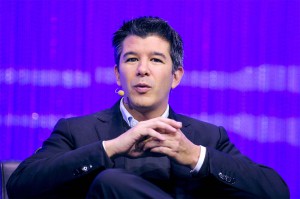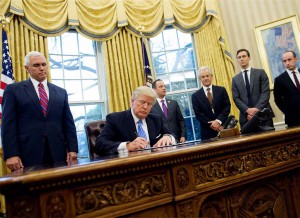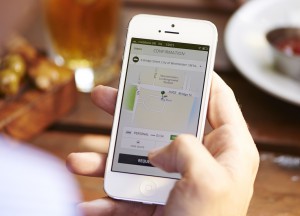Already reeling from a threatened boycott against his company, as well as mounting internal opposition, Uber CEO Travis Kalanick has resigned from President Donald Trump’s economic advisory panel.
The move was linked to the new administration’s controversial Executive Order on travel and immigration that critics have denounced as a “Muslim Ban.” That triggered a wave of protests across the U.S., as well as attacks on Uber which, some critics claimed, was lending its support to the new president.
“Joining the group was not meant to be an endorsement of the president or his agenda but unfortunately it has been misinterpreted to be exactly that,” Kalanick reportedly advised his staff in an e-mail.
Company representatives subsequently acknowledged that Kalanick had resigned from the advisory panel which was set to meet with the president today.
Kalanick and Uber have taken a number of controversial actions in recent years, often fighting against local and state regulations that they said favored the established taxi and livery industry. In December, Uber took a hail of criticism in California for launching a pilot program to test a small fleet of autonomous Volvo SUVs in San Francisco without obtaining a state permit.
But such moves have also won support for Uber’s maverick determination.
(For more on the threatened Uber boycott, Click Here,)
The latest controversy threatened to be more damaging. Critics complained about Kalanick’s decision to join the advisory panel but that erupted into a more serious challenge when some felt the founder of the ride-sharing giant was lending his support to the president’s travel ban.
Last Saturday, protestors gathered at airports across the country. Meanwhile, a number of taxi drivers in New York City launched a boycott, refusing to take fares to JFK Airport, the city’s primary international gateway. Uber responded by eliminating its so-called surge pricing, the additional fees it imposes when demand is high. The company was accused by critics on social media of trying to work around the travel ban protests.
Uber quickly rescinded its action and issued a series of statements saying that it was opposed to the presidential order’s restrictions on U.S. green card holders. The service also announced it was setting up a fund to help those employees who might be affected by the ban. A number of its drivers are immigrants.
By then, however, Uber was hit by calls for critics to delete the service’s smartphone apps and cancel their accounts with the company.
(Daimler developing ties to Uber. Click Here for more on plans to introduce a fleet of autonomous Mercedes models.)
Complicating matters, rival ride-sharing service Lyft said it would donate $1 million to the American Civil Liberties Union, a group that, over the weekend, took the administration to court, convincing a federal judge to issue a partial ban on the Trump order.
“There are many ways we will continue to advocate for just change on immigration but staying on the council was going to get in the way of that,” Kalanick wrote to Uber employees. “The executive order is hurting many people in communities all across America. Families are being separated, people are stranded overseas and there’s a growing fear the U.S. is no longer a place that welcomes immigrants.”
Kalanick is the first executive to quit the council, but at least one, Tesla CEO Elon Musk, said in a Thursday tweet that he “and others will express our objections to the recent executive order on immigration and offer suggestions for changes to the policy.”
Major technology companies, including not only Uber but Apple and Google, have been among the most visible corporate critics of the Trump ban. Ford Motor Co. also joined the list this week and several company insiders told TheDetroitBureau.com they were expecting a similar statement from General Motors, though none has yet been issued. CEO Mary Barra also sits on the presidential advisory panel.
(Ford adds voice to criticism of Trump travel and immigration ban. Click Here for the latest.)




It would be much better to be heard than not to have any voice in what’s going to happen. Too many people have decided that the Trump Administration cannot do anything that’s good, but if he’s willing to listen and you don’t speak then you have little entitlement to an opinion.